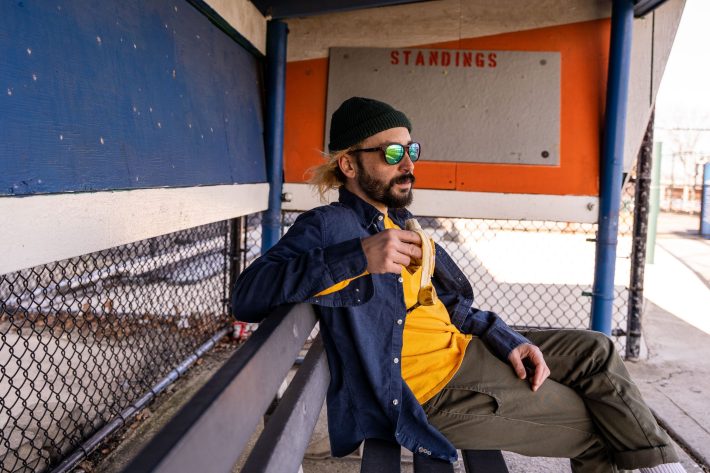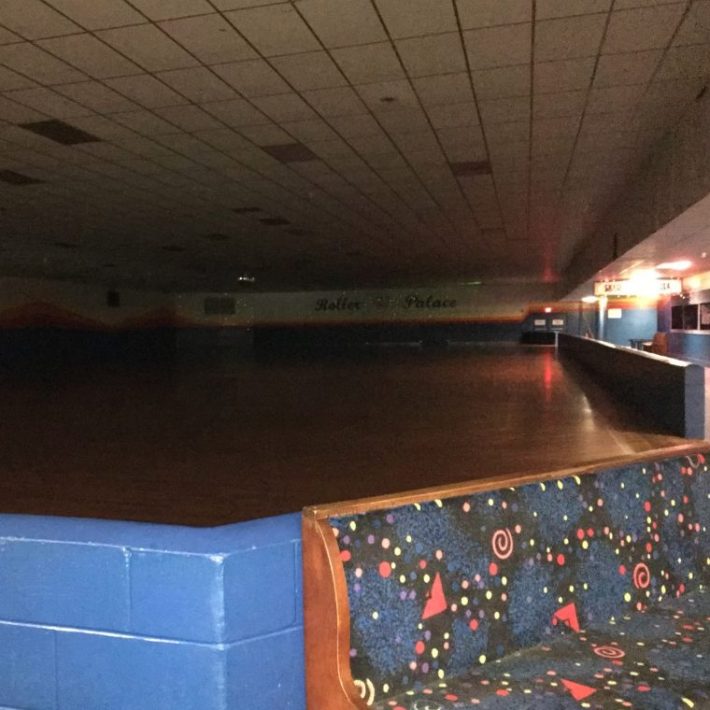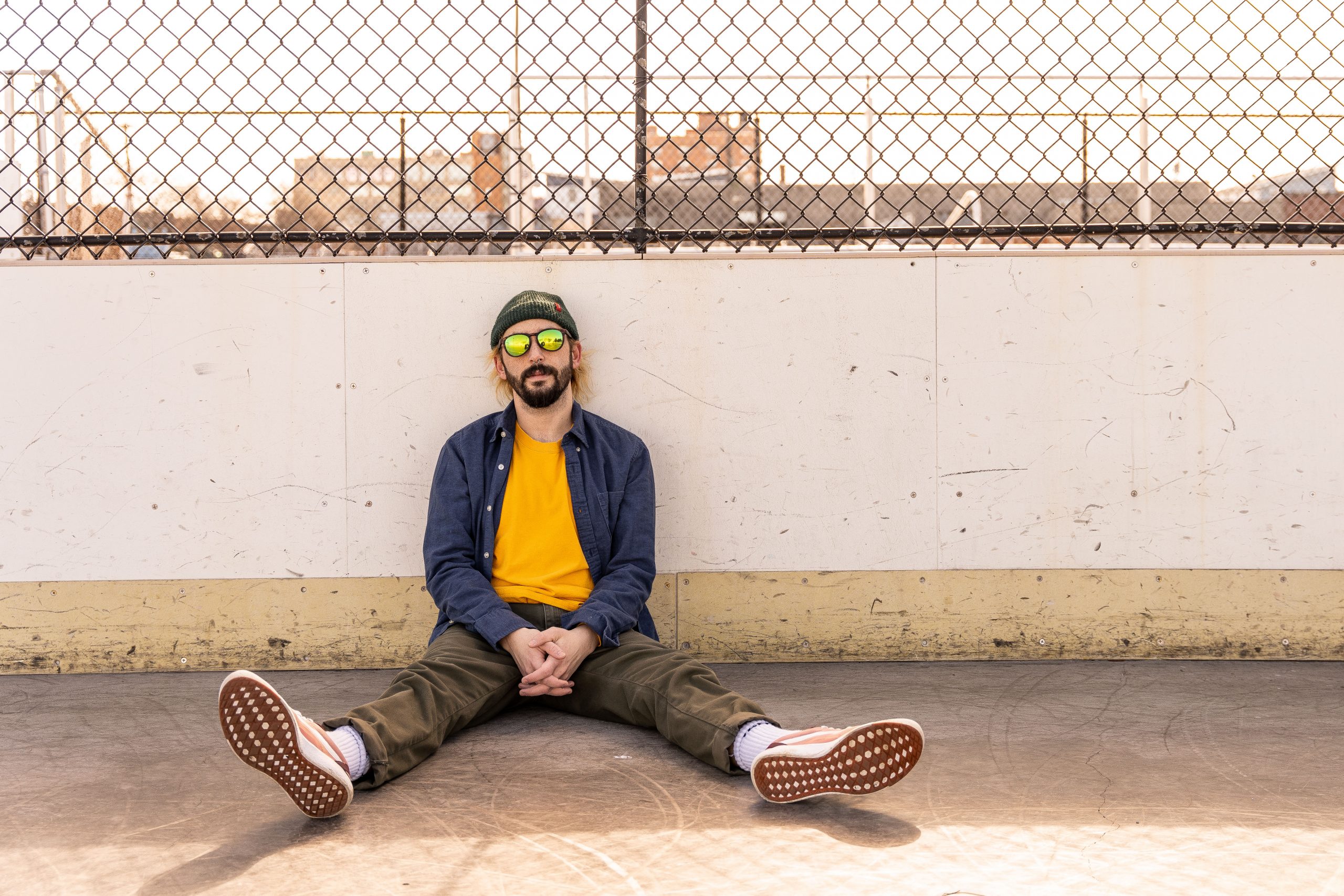Stream the album and read our interview with Jade Lilitri
When Adam Schlesinger passed away from COVID-19 complications in April 2020, most paid tribute to the hits: "Stacy's Mom," "Radiation Vibe," "Red Dragon Tattoo," "That Thing You Do!" Oso Oso mastermind Jade Lilitri loved those songs as well, but he found himself more inspired to create his "I Want An Alien For Christmas," or "Peace And Love," or "Planet Of Weed" -- the "inessential" Fountains Of Wayne songs that are nonetheless essential to Schlesinger's legend as a consummate power-pop pro. Lilitri had not yet begun working on the follow-up to 2019's emo/indie crossover classic Basking In The Glow, which, like its equally magnificent predecessor The Yunahon Mixtape, resulted from a meticulous and isolating process of writing every single part himself. "I don't know this for sure, but to write that many songs, [Adam] probably had to at some point do off-the-cuff type of stuff, just let it go and let the songs be written," Lilitri speculates during our Zoom call.
With that in mind, Lilitri and his cousin/creative partner Tavish Maloney decamped to Yunahon producer Billy Mannino's studio in Queens for a month-long sequester. The duo put 13 songs to tape, assuming they'd take some time off before revisiting and revising the workload for a proper Oso Oso LP4. Maloney died about a month later, at the age of 24. From that point, Lilitri decided those 13 songs were the album. There were no further edits once he handed the recordings over to Mike Sapone for mixing; the sore thumb out today is pretty much the exact same version that Tavish Maloney heard. "There is no extra," Lilitri states. "Everything you hear is everything we did."
But while death has a way of clarifying an artist's sense of purpose, so does being broke as shit. For all the heavy lessons about seizing the day and spiritual surrender that Lilitri absorbed over the past few years, sore thumb doesn't exist if Lilitri heeds the sage advice of the cosmos: Never tie your fortunes to the Chicago Bears. "Me and [Tavish] lost a decent amount of money during the first week of the NFL playoffs," Lilitri admits. "I missed every single game that weekend."
This run of bad luck expedited the ultimatum he was staring down as the pandemic stunted whatever long-tail success he could maintain after Basking In The Glow broke Oso Oso into the rarefied territory of year-end lists and festival slots in 2019. After years of self-releases and struggle as a pop-punk and emo undercard, Lilitri had finally become financially solvent as a musician; he was still living humbly to that point, moving out of his parents' house in Long Island to Kingston, Pennsylvania, a quiet enclave near Wilkes-Barre best known for being the original hometown of Title Fight. As with most emo-leaning musicians who experience some degree of success, Lilitri eventually moved to Philly, but he ended up back in Luzerne County after coming to terms with the quality of living he could expect in the city: "The apartment that I had started leaking mushrooms from the wall, actual fungus."
Lilitri now lives in Dallas, Pennsylvania, a town of about 2,000 that doesn't provide much distraction aside from the occasional nature walk and the fortunes of the Scranton-Wilkes Barre RailRiders minor league team -- and even that's in jeopardy. He also doesn't have a car, but despite this frugal arrangement, "I made it decently about a year into the pandemic and then ran out of money." Lilitri weighed the possibility of delivering food for the next month to pay his bills or dipping into the recording budget. He chose the latter, but after putting his financial well-being in the hands of Mitch Trubisky and Taylor Heinecke, Oso Oso needed to get back in the studio ASAP.
This is all crucial backstory because for all of the devastation that shaped sore thumb, the record itself is the product of two guys taking acid, getting into Nerf fights, and letting the influence of late '90s Gap soundtracks take proper hold. "I got a text from my dad where said he was listening to a Bruce Springsteen song on the radio and it took 15 days or something like that to record," Lilitri recalls. "And then a Cake song came on after and he was like, 'The Cake song is so much better.' That got me listening to more Cake."
There is no indication whatsoever that an impending reckoning with mortality was in the air at Two Worlds Studios. While the beaming power-pop of Oso Oso's previous two albums still serves as the foundation of sore thumb, we also get Britpop goofs, a character sketch about a drunken street preacher that sorta kinda sounds like Sugar Ray, plinking piano pop, and the final song Maloney ever played on. The vinyl-only hidden track "Tav World" closes out sore thumb as a 30-second tribute to weed, complete with bong tokes.
Lilitri will be the first to tell you that "Nothing Says Love Like Rehydration," stashed deep into the album's back half, is not a particularly great song. He's not even sure if it's a good song -- he initially wrote it as a belated Christmas gift for his father, inspired by an industrial strength hangover at his parents' house during the 2020 holidays. "The only thing I really questioned is whether I should leave off 'the Gatorade song,' because I feel like that's gonna be a miss," he jokes. Perhaps it's not essential, but it's quintessential of sore thumb's cheerfully insouciant spirit -- two lifelong buds spending a month working as hard as possible to avoid getting a real job and creating a poignant tribute to a friendship cut tragically short.
Below, stream sore thumb and read excerpts from our conversation.
"Pensacola" doesn't sound anything like "an Oso Oso song." Was that part of the reason it was released independent of sore thumb?
JADE LILITRI: We put it out first because we felt the most confident about it, in that it is different from Basking In The Glow. Like everything on the album, we didn't think, "This is the album." It was just a song that came out one day. We were going to record the drums for a different song, spent all day on it, and it turned into what it was. The character was based around these two dudes -- one guy that I used to live with back in the day, he built this motor for his bike to get to work, he couldn't drive because he had too many DWIs. And also the neighbor that I met who got out of prison recently and can't really leave his house. We live in this complex off the highway, so if you don't have a car, there's not much you can do. I was just talking to him about that, and then for the chorus, I kept trying to sing something and kept hearing "Pepsi Cola." That turned into Pensacola, and that's the setting.
Have you followed the response online?
LILITRI: I used to be [online] all day when I put something out. The night that we put out "Pensacola," we rolled a blunt in celebration, read through a couple of Twitter comments and RTs. I try to stay off it as much as possible because the compliments are great, but they don't uplift you as much as the negative comments get you down.
Are there any particular negative comments that stuck with you?
LILITRI: I was doing that tour in the fall [of 2021] very sober and I was very stoked on it. But I guess someone looked into one of the Facebook groups and everyone thought I was really fucked up on drugs. It really got me bummed out. And then I just decided it's time to stop reading. You feel like you want to respond if the littlest thing is incorrect.
It was very heartwarming to end 2021 watching the Counter Intuitive Showcase with Oso Oso and the Hotelier on the same bill again, given your shared history.
LILITRI: Me and Christian [Holden] went to a Celtics/Knicks game the night before. It's one of the things where I felt, "I'm very lucky to do this." It was more of a vacation.
Since the time you played with them at Pitchfork Festival in 2016, the Hotelier have gone on kind of an indefinite hiatus with Christian exploring a bunch of other interests, whereas Oso Oso have now put out three albums. Do you two ever talk about the "career" component of making music?
LILITRI: We try to talk about that stuff as little as possible. It isn't from "burnout." Being a musician and trying to make that work is a very hard thing. I find myself in a position where I feel like I don't have that many skills at anything else. I've devoted so much of my life into this that I almost feel the need to continue doing it. Whereas other people are super skilled and can buy buses.
Aside from a couple of contributions from Tavish, it looks like you've played every instrument on the record, including the drums. How did this process differ from the past?
LILITRI: Usually what happens is that I'll demo out the drums and on the record, I'll get someone different to do the drums. I always get really picky about my recordings, and during the last one, Tavish wanted to come along to film it, but [producer] Mike Sapone doesn't really like to film. With this one, he was with me when we decided I had to make this record to make money, and the next day we were just messing around making a joke demo. Then we were like…"This could be fun!" It was Monday-Friday in the studio, we'd start at 10 or 11 and go until whenever. It was very laid back. We had a whole month and some days we didn't write at all. There were days where we watched the Cecil Hotel documentary and Jackass 3. The most degenerate thing we did, we had the PlayStation NCAA game with Melo on the cover, we would do the mascot game and set it to the computer and gamble on it. There was one night where we took a bunch of acid and we were supposed to be recording drums, but we just kinda stopped the drums and had these bow-and-arrow Nerf gun fights.

There's a very heavy drug presence in the lyrics. Did they have an impact on the actual songwriting process?
LILITRI: With the amount of time that we had, there were definitely some tracks where, "Oh yeah, maybe the drums are so simple because I was on acid." But with the lyrics, other than being super stoned or on Adderall, they came while recording the vocals. If I didn't have a verse late at night, I would stay up and figure it out by the next morning.
"Because I Want To" strikes me as one of the "off-the-cuff" songs you were talking about before.
LILITRI: We got to the studio on a Tuesday night, probably around 7 or 8 PM, brought our stuff in and talked about the plan for the month. We were just kinda messing around and picked up the guitars... it's just that one chord, and I said something like, "Tavish, give me something on the piano that's bouncy!" And then I literally wrote the first verse and chorus of that in the first 30 minutes we were there. Later in the week, we wrote a bridge and a second verse.
I imagine "Nothing Says Love Like Dehydration" was created pretty similarly.
LILITRI: A couple of years ago, I asked my dad what he wanted for Christmas and he was like, "I want you to write a song for me." And I never did. I got him a normal gift. The Christmas before making this album, I must've gotten so drunk the night before that I was completely incapacitated. I could not get up and just ruined Christmas. I have a bad relationship with alcohol, so I wrote that as a breakup song with alcohol. I just felt like I didn't want to change that line because it's so true. There's been so many times where you're viciously incapacitated and someone brings you a Gatorade as a sign of love or goodwill.
I know that Tavish was such an important part of your life personally and with Oso Oso. Was there ever any question about whether the band would continue?
LILITRI: It wasn't ever a thing like, "Oh, I don't know if I can ever do this again." With Tavish, it's more like a deep, deep family bond. We are literally related. When we were filming and making the record, we constantly kept talking about how many different songs would be like, "Aw, people are gonna hate this." And then I'd say, "Well, I'm done after this and then we'll make your record."
He was brainstorming that at the time, and that's the most upsetting thing about it. The thing that's so significant in this is that with Tavish, there's certain things he does like whistles and percussion and stuff like that. But I've always been really controlling, I have to play all the guitars, and he always wanted to come along and sneak in and get in some guitars. The whole time when we would joke about, "Maybe this is the record," we would sit down and he'd tell me, "I know you're excited about the song because you made it that day, but I'm telling you, this isn't the record. You have to do it the right way."
Fast forward to one of the last nights we were recording everything and we had to get some feedback. "Oh fuck, I don't wanna do that." Tavish was like, "Yo, I'll do the feedback!" He got stoked and I don't think he understood how long it'd take. So 45 minutes later he's in there, still having a decent time, but me and Billy are in the booth like, "Let's just let him play a part." So at the end of ["Give A Fork"], after he finished the feedback, we gave him 30 minutes: "See if you can do something." He wasn't really stoked on what he wrote and asked, "Let me do it tomorrow. Please." He stays up all night writing a really cool part and is so stoked on it.
So we're driving home and playing the demo and he went from "You have to really make sure that you actually record the album" to "I dunno, this could be the record!" once he was on it. He was messing with the speakers in the car, turning the bass and the treble down: "Just a little bit of this, it sounds real nice!" I had to tell him, "If we record it, I'm gonna let you play your part." If anything, I regret how seriously I took stuff like that and how controlling I was over wanting to play everything on all these records. But putting this out, there's no question in my mind we did it right.

sore thumb is out now on Triple Crown. Purchase it here.






